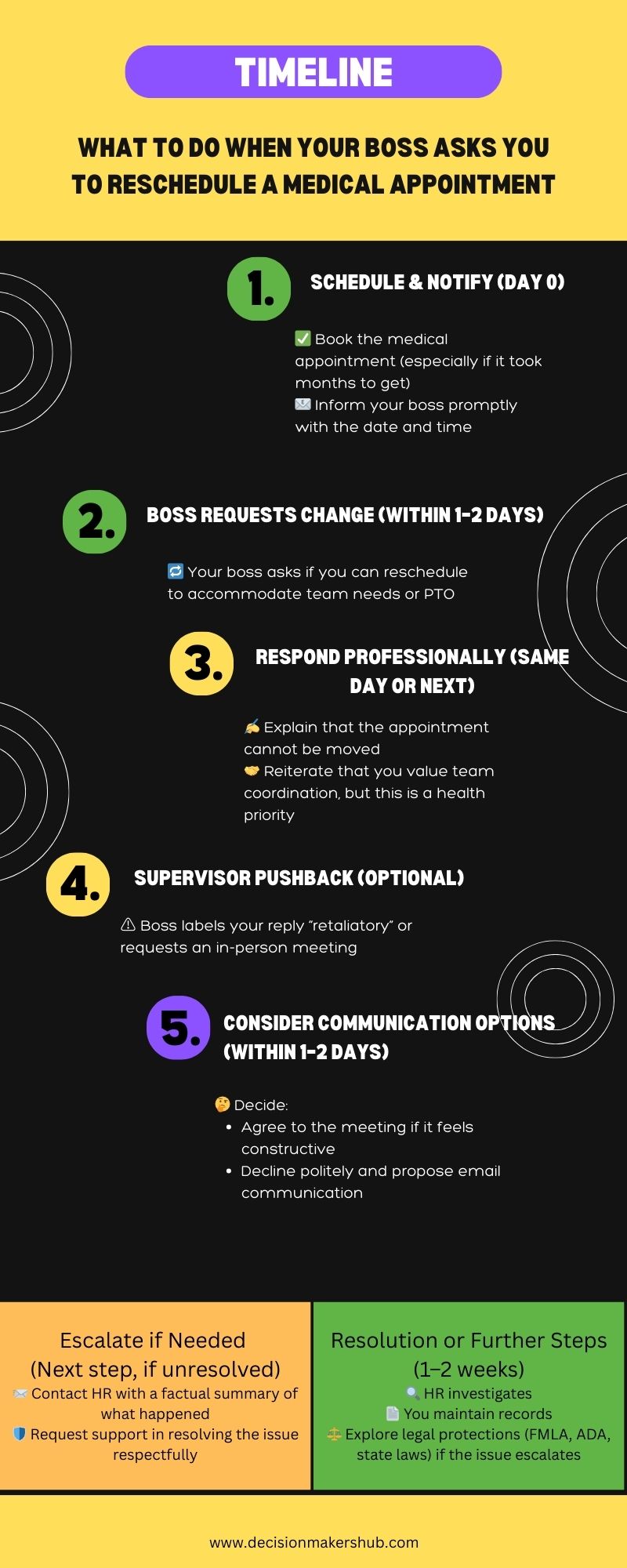Scheduling a critical medical appointment can feel like a victory, especially when it’s for a procedure that requires urgent attention. But what happens when your boss asks you to reschedule it for their convenience? If you’re searching for advice on similar situations, this guide is for you. We’ll explore how to respond to such requests, whether to involve HR, and how to protect your health and rights while maintaining professionalism. This evergreen article provides clear, actionable steps to navigate this workplace challenge.
The Scenario: A Medical Appointment vs. Workplace Expectations
Imagine scheduling a full-day medical procedure, only to learn the earliest available slot is three months away. You promptly inform your supervisor, expecting understanding, but instead, they suggest rescheduling to align with your work schedule or previously approved time off. Their reasoning? It would make “scheduling easier” for the team. When you explain that rescheduling isn’t feasible and clarify that the suggested time off was canceled, they label your response as “retaliatory” and request an in-person meeting.
This situation raises questions: Should you agree to the meeting? Is it worth involving HR? How do you balance your health needs with workplace demands? Let’s break it down.
Understanding Your Rights for Medical Appointments
Employees have legal protections when it comes to medical appointments, especially for serious health conditions. In the U.S., several laws may apply:
-
Family and Medical Leave Act (FMLA): The U.S. Department of Labor outlines that FMLA allows eligible employees up to 12 weeks of unpaid, job-protected leave for serious health conditions, including medical appointments. However, FMLA typically applies to ongoing treatment, not single appointments, unless part of a broader condition.
-
Americans with Disabilities Act (ADA): The ADA requires employers to provide reasonable accommodations for employees with disabilities, which could include time off for medical procedures if the condition qualifies as a disability.
-
State Laws: Some states have laws protecting employees’ rights to take time off for medical appointments without retaliation. Check your state’s labor department for specifics.
Additionally, many companies have policies allowing paid time off (PTO) or sick leave for medical needs. According to a 2022 Bureau of Labor Statistics report, 79% of private industry workers had access to paid sick leave, though policies vary.
Employee Rights for Medical Appointments – Quick Overview
| Scenario | Employee Rights | Applicable Laws/Policies | Action Steps |
|---|---|---|---|
| Scheduled Medical Procedure | Right to take time off for medical appointments | FMLA, ADA, Company PTO/Sick Leave Policies | Inform supervisor in advance, offer solutions (e.g., rescheduling around work duties) |
| Boss Requests to Reschedule | Right to not reschedule (especially for critical appointments) | FMLA, ADA, Company PTO/Sick Leave Policies | Politely refuse rescheduling, explain feasibility issues, offer alternatives |
| Boss Labels Response as Retaliatory | Right to challenge retaliation or discrimination | FMLA, ADA, Anti-retaliation Laws | Document communication, seek HR guidance if needed |
| Need to Involve HR | Right to escalate if rights are threatened or violated | Anti-retaliation Laws, State-Specific Protections | File a formal complaint with HR, provide documentation |
When Work Clashes with Health: A Timeline for Handling Medical Appointment Conflicts at Work

Why Your Boss’s Request Raises Concerns
Asking an employee to reschedule a medical appointment, especially one booked months in advance, can be problematic for several reasons:
-
Health Prioritization: Delaying a procedure could worsen your condition or prolong recovery.
-
Practicality: Medical appointments, especially for specialists, often have long wait times. A 2023 Merritt Hawkins survey found average wait times for specialist appointments range from 20 to 52 days, with some specialties booking months out.
-
Professionalism: Suggesting you use unrelated PTO or implying your health needs disrupt scheduling can feel dismissive and inappropriate.
Labeling your response as “retaliatory” further escalates the issue, potentially signaling a misunderstanding or lack of empathy. This dynamic can make you hesitant to engage further, especially in an in-person meeting.
Should You Agree to an In-Person Meeting?
Your supervisor’s request for a meeting requires careful consideration. Here’s a comparison of agreeing to meet versus declining:
|
Option |
Pros |
Cons |
|---|---|---|
|
Agree to the Meeting |
– Opportunity to clarify your position |
– Could be confrontational if not handled well |
|
Decline the Meeting |
– Avoids potential conflict |
– Might be seen as uncooperative |
When to Agree
Consider the meeting if:
-
You believe open communication could resolve the issue.
-
Your supervisor is generally reasonable and the request was a misstep.
-
You want to clarify your health needs and reinforce your rights.
When to Decline
Opt out if:
-
You’re uncomfortable with a face-to-face discussion or fear retaliation.
-
The issue feels resolved, and further discussion seems unnecessary.
-
You prefer to involve HR for a more formal approach.
If you decline, respond politely via email, suggesting alternative communication (e.g., email or a virtual meeting) or stating you’re focusing on your health and work duties.
Should You Involve HR?
Involving HR depends on the severity of the situation and your goals. Here’s when to consider it:
When to Involve HR
-
Your supervisor’s response feels retaliatory or discriminatory.
-
You’re concerned about job security due to your health needs.
-
The issue persists despite your attempts to resolve it.
When to Avoid HR
-
The issue seems like a one-time misunderstanding.
-
You’re confident you can handle it directly with your supervisor.
-
You’re planning to leave the job soon, and escalation feels unnecessary.
If you involve HR, provide a factual summary of the email exchange and your concerns. For example:
Subject: Concern Regarding Supervisor’s Request to Reschedule Medical Appointment
Dear [HR Representative],
I am reaching out to discuss a recent interaction with my supervisor. On [date], I informed them of a medical procedure scheduled for [date], booked three months in advance due to availability. They suggested rescheduling to align with previously approved PTO, which I had canceled over a month ago. When I explained that rescheduling wasn’t feasible, they described my response as “retaliatory” and requested an in-person meeting.
I am concerned about the implication that my health needs are secondary to scheduling convenience and the characterization of my response. I’d like guidance on how to proceed while ensuring my rights are respected.
Thank you,
[Your Name]
This response reinforces your position, addresses the “retaliatory” label, and proposes email communication.
Protecting Your Health and Career
Navigating this situation requires balancing your health with workplace dynamics. Here are additional tips:
- Document Everything: Save all emails related to the appointment and your supervisor’s response.
- Know Your PTO Policy: Review your company’s sick leave or PTO rules to ensure compliance.
- Seek Support: Consult a trusted colleague or mentor for advice on handling workplace conflicts.
- Plan for the Appointment: Arrange coverage or complete critical tasks early to minimize disruption.
Key Takeaways
- You have the right to prioritize medical appointments, especially for procedures booked months in advance.
- A boss’s request to reschedule a doctor’s appointment for scheduling convenience can be inappropriate and impractical.
- Agreeing to an in-person meeting can clarify misunderstandings, but declining is valid if you prefer email or fear confrontation.
- Involving HR is warranted if the situation feels retaliatory or your rights are at risk.
- Professional, factual communication protects your health and career while maintaining a record.
FAQs
Q: Can my boss ask me to reschedule a medical appointment?
A: Yes, but it’s inappropriate to pressure you, especially for a procedure booked months out. You’re entitled to take time for medical needs under laws like the FMLA or ADA.
Q: Should I agree to an in-person meeting with my boss about this?
A: Agree if you think it could resolve the issue and your boss is reasonable. Decline and suggest email communication if you’re uncomfortable or want a record.
Q: When should I involve HR in a conflict about a medical appointment?
A: Involve HR if your boss’s response feels retaliatory, discriminatory, or threatens your job security, or if the issue persists.
Q: How do I respond to my boss without escalating the situation?
A: Write a professional email explaining why rescheduling isn’t feasible, clarifying your intent, and proposing solutions like email communication.
Q: What are my rights for taking time off for a doctor’s appointment?
A: Under the FMLA, you may take leave for serious health conditions, and the ADA requires accommodations for disabilities. Company PTO or sick leave policies also apply.
By standing firm on your health needs and communicating professionally, you can navigate this workplace challenge with confidence and protect your well-being.

One thought on “How to Handle a Boss’s Request to Reschedule a Medical Appointment”